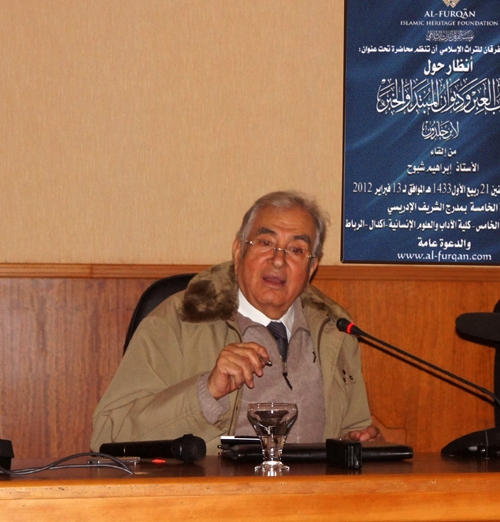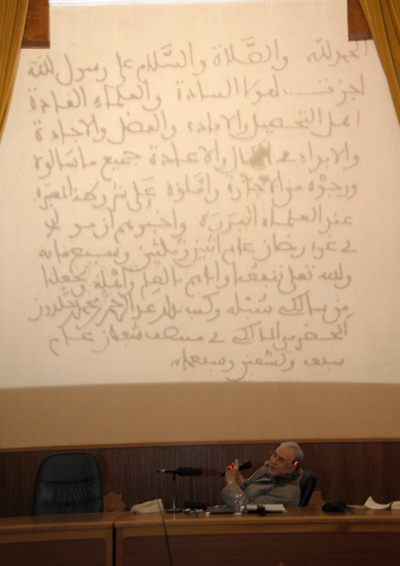On 13th February 2012, Dr. Ibrahim Chabbouh, member of the Board Experts of Al-Furqān’s Manuscript Centre, gave a lecture at the Faculty of Arts of the Mohamed V University of Rabat on Ibn Khaldūn’s book Kitāb al-‘Ibar wa Diwān al-Mubtada’ wa-al-Khabar. The lecture was organised by the Manuscripts Centre of the Al-Furqān Islamic Heritage Foundation as part of the Moroccan Book Exhibition.
The session was chaired by Dr. Djilali Adnani, Professor of History in the Faculty of Arts. Dr. Adnani introduced the lecturer and his academic background, pointing out that Dr. Chabbouh was carrying out the revision and editing of Ibn Khaldūn’s Al-‘Ibar, on the basis of the author’s original copies containing Ibn Khaldūn’s revision notes and addenda. Dr. Chabbouh spent some three decades on this task and has so far published 12 out of 14 volumes of Al-‘Ibar, and he is expected to prepare their tables of content which come out in two volumes.

In his critical revision of Al-‘Ibar, Dr. Chabbouh relied on the contribution of a group of experts both from the Arab world and Europe who specialise in the issues dealt with in the book. After laying down a scientific working methodology for this work, Dr. Chabbouh used his expertise on Ibn Khaldūn to tackle the part of it that particularly deals with African states, Arab and Berber lineages. Al-‘Ibar is a work on the history of History.
Dr. Chabbouh began his lecture with an introduction of the importance of Ibn Khaldūn, describing him as one of the symbols of enlightenment at a global level whose reputation spread far and wide in the East and in the West where his scholarship was received with a degree of interest and respect previously unheard of for a Muslim scholar. Afterwards, Dr. Chabbouh dealt with the question of the gathering of Ibn Khaldūn’s truly original manuscripts in the libraries of different countries, as well as recording their various publications and their translations. In the wake of the translation of his first book, which became famously known as the Muqaddimah, his name started to appear in the writings of Western researchers and scholars who spread the view that Ibn Khaldūn was the founder of sociology and that the Muqaddimah was an original leading work which was the first to lay the foundation of this discipline.
The lecturer went on to deal with four issues regarding Al-‘Ibar.
The first issue concerns the question of with which book Ibn Khaldūn actually began writing his work. In this respect Dr. Chabbouh indicated that his initial book was the Muqaddimah, which Ibn Khaldūn said he isolated himself to complete it in five months in 779 AH, after revising (itlā‘), editing and proof-reading it. He is said to have then written Akhbār al-‘Arab wa al-Barbar wa al-Zanata.
The second point was about the term “i‘tabara” which recurs frequently in the final chapters of the Muqaddimah. Dr. Chabbouh pointed out that this term occurs in well-defined meanings which, in his view, is a sign of intellectual flexibility, and of invitation to research and to debate. Meanwhile, the lecturer specified that the term ‘ibar, which is part of the book title, is not confined to the usual meaning of ‘maw‘iżah’ as used by Ibn Khaldūn’s student Al-Maqrīzī in his book Al-Mawā‘iz wa al-I‘tibār; but rather extends with Ibn Khaldūn to mean the examination of the reality of things and their evolution, and the way these things are utilised in the organisation of societies and urbanism.
The third point pertains to the issues surrounding Ibn Khaldūn’s intellectual sources. Admitttedly, some biographical works denigrated him, accusing him of having used academic sources without citations. These in additions to other voices which claimed that the intellectual structure of the Muqaddimah originated in the letter of the Ikhwān Al-Šafā’, which Ibn Khaldūn did not acknowledge. Dr. Chabbouh answered such claims, pointing out that Ibn Khaldūn arrived in Egypt in 784 AH, that is to say, well after the Fatimid dynasty had disappeared and along with its jurisprudential heritage, at a time when the Ayyubi colleges were set up to review the Sunni jurisprudential schools. Therefore, the lecturer said, no room was left for the already banned Fatimid literature to influence the intellectual life, especially the Sunni literature spread far and wide.
The fourth point was regarding Ibn Khaldūn’s division of the ‘Arabs into four entities or ‘ages’: the Arabising Arabs (al-‘arab al-‘āribah), The Arabised Arabs (al-musta‘ribah), the Arabs that became successors to the Arabs (al-‘arab al-tābi‘ah lī al-‘arab) and the de-Arabised Arabs (al-‘arab al-musta‘jamah) .
The lecturer went on to say that Ibn Khaldūn’s intellectual endeavour while in the Maghreb was focused on the Arabs and the Berbers; whereas during his Egyptian period, he devoted his thinking to the non-Arabs and their background. This enabled him to get a glimpse of the vast Muslim world with all its territories and its peoples, and to update his theory of history in an unprecedented fashion, after which he re-organised his work into an introduction and three books.
Dr. Chabbouh ended his lecture by showing some examples of Ibn Khaldūn’s writing as well as a table for the dated manuscripts on which he based his work. An animated debate followed on the lecture, which was attended by professors, PhD students, researchers and other prominent personalities from the cultural and political spheres. Important among these was his excellency Mr. Rafi‘ Ben Achour, Tunisia’s ambassador to Morocco.


